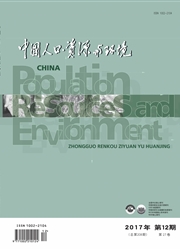

 中文摘要:
中文摘要:
在可持续发展和扶贫框架下发展绿色经济与国际可持续发展制度建设及改革是当前世界可持续发展的核心和关键,也是"里约+20"峰会的两个主题。首先,绿色经济是体现经济社会与资源环境相协调和可持续发展的根本途径。绿色经济的核心是以低的自然资源消费、低排放、低污染,达到高的自然资源利用效益,实现高的经济社会发展水平,提供高的生活水平和优良的生活环境。全球绿色经济的发展潮流,将引发社会形态由"工业文明"向"生态文明"转变。虽然经济发展和消除贫困是发展中国家当前首要和压倒一切的优先任务,但也必须探索新型的绿色低碳工业化和现代化道路,在实现工业文明的过程中,努力建设生态文明,实现跨越式发展。同时积极应对全球绿色低碳转型中新的经济、贸易、技术竞争规则和格局的变动,加强先进技术创新,提升自身的低碳竞争力。其次,公平获取可持续发展的理念,应成为国际可持续发展制度建设和改革的基本原则。可持续发展要求既要促进经济社会发展与资源环境相协调,促进"代际公平",又要关注欠发达地区消除贫困,提高生活质量,改善生态环境,实现"国别公平"、"人际公平"。因此,国际可持续发展制度框架的建设和改革,要体现世界各国公平获取可持续发展的理念和原则,全面均衡地反映不同国情和发展阶段国家的利益诉求。主要表现在公平享有全球环境空间、公平获得现代优质能源服务、公平适应全球环境变化、公平承担责任义务及公平的国际制度和机制。中国需要统筹国内外两个大局,走中国特色的绿色低碳发展之路。最后,中国的国情和发展阶段特征,在可持续发展领域又面临比发达国家更多的困难和更严峻的挑战。在全球发展绿色经济,努力实现可持续发展的大背景下,中国要统筹国际国内两个
 英文摘要:
英文摘要:
Rio + 20, United Nations Conference on Sustainable Development, will focus on two themes: (a) a green economy in the context of sustainable development and poverty eradication, and (b) the institutional framework for sustainable development. The two themes demonstrate the core of and key to global sustainable development. Growing a green economy is the fundamental way for achieving balanced and sustainable progress across the economic, social, and environmental dimensions. The core of green economy is achieving high productivity of natural resources, enhanced economic and social development, and a high standard of living in a quality environment at low level of resource consumption, emissions and pollution. The global trend of green economic development will trigger the transition from an industrial civilization towards an ecological civilization. Despite the first and foremost priority of economic development and poverty eradication, developing countries must explore a new course of leapfrog of green and low-carbon industrialization and modernization that nurtures ecological civilization during industrial development. Meanwhile, developing countries should actively be involved in development of rules of competition in economy, trade and technology in the global transition towards a green and low-carbon economy, strengthen technological renovations, and improve competitiveness of a low-carbon economy. Equitable attainment of sustainable development ought to be the fundamental principle of the institutional framework for sustainable development. The three pillars of sustainable development, including economic development, social progress and environmental protection, are interdependent and mutually reinforcing. Sustainable development requires not only balanced consideration of economic and social development and environmental protection, which is conducive to intergenerational equity, but also poverty eradication in underdeveloped regions that contributes to higher standard of living and ecological en
 同期刊论文项目
同期刊论文项目
 同项目期刊论文
同项目期刊论文
 期刊信息
期刊信息
